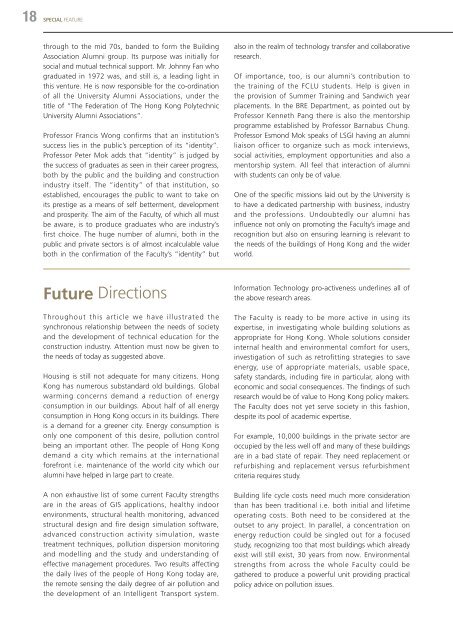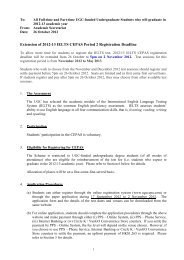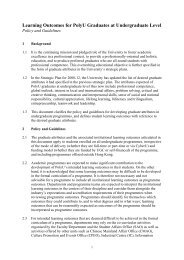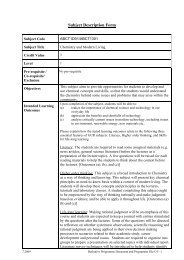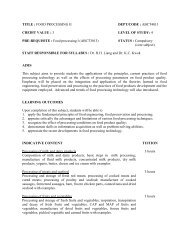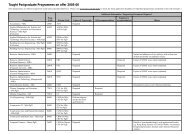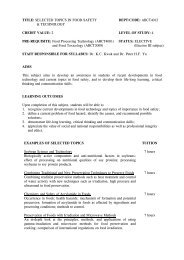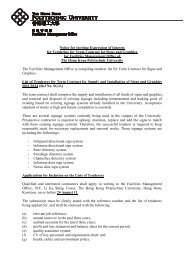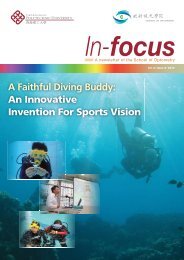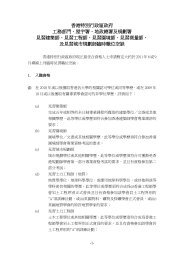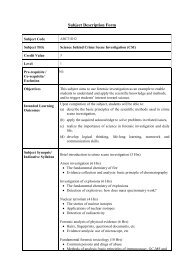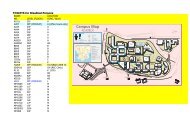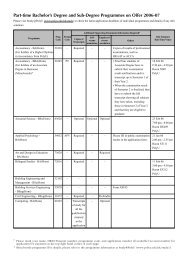Issue No. 4 (August 2007) - The Hong Kong Polytechnic University
Issue No. 4 (August 2007) - The Hong Kong Polytechnic University
Issue No. 4 (August 2007) - The Hong Kong Polytechnic University
Create successful ePaper yourself
Turn your PDF publications into a flip-book with our unique Google optimized e-Paper software.
18 SPECIAL FEATURE<br />
through to the mid 70s, banded to form the Building<br />
Association Alumni group. Its purpose was initially for<br />
social and mutual technical support. Mr. Johnny Fan who<br />
graduated in 1972 was, and still is, a leading light in<br />
this venture. He is now responsible for the co-ordination<br />
of all the <strong>University</strong> Alumni Associations, under the<br />
title of “<strong>The</strong> Federation of <strong>The</strong> <strong>Hong</strong> <strong>Kong</strong> <strong>Polytechnic</strong><br />
<strong>University</strong> Alumni Associations”.<br />
Professor Francis Wong confirms that an institution’s<br />
success lies in the public’s perception of its “identity”.<br />
Professor Peter Mok adds that “identity” is judged by<br />
the success of graduates as seen in their career progress,<br />
both by the public and the building and construction<br />
industry itself. <strong>The</strong> “identity” of that institution, so<br />
established, encourages the public to want to take on<br />
its prestige as a means of self betterment, development<br />
and prosperity. <strong>The</strong> aim of the Faculty, of which all must<br />
be aware, is to produce graduates who are industry’s<br />
first choice. <strong>The</strong> huge number of alumni, both in the<br />
public and private sectors is of almost incalculable value<br />
both in the confirmation of the Faculty’s “identity” but<br />
also in the realm of technology transfer and collaborative<br />
research.<br />
Of importance, too, is our alumni’s contribution to<br />
the training of the FCLU students. Help is given in<br />
the provision of Summer Training and Sandwich year<br />
placements. In the BRE Department, as pointed out by<br />
Professor Kenneth Pang there is also the mentorship<br />
programme established by Professor Barnabus Chung.<br />
Professor Esmond Mok speaks of LSGI having an alumni<br />
liaison officer to organize such as mock interviews,<br />
social activities, employment opportunities and also a<br />
mentorship system. All feel that interaction of alumni<br />
with students can only be of value.<br />
One of the specific missions laid out by the <strong>University</strong> is<br />
to have a dedicated partnership with business, industry<br />
and the professions. Undoubtedly our alumni has<br />
influence not only on promoting the Faculty’s image and<br />
recognition but also on ensuring learning is relevant to<br />
the needs of the buildings of <strong>Hong</strong> <strong>Kong</strong> and the wider<br />
world.<br />
Future Directions<br />
Throughout this article we have illustrated the<br />
synchronous relationship between the needs of society<br />
and the development of technical education for the<br />
construction industry. Attention must now be given to<br />
the needs of today as suggested above.<br />
Housing is still not adequate for many citizens. <strong>Hong</strong><br />
<strong>Kong</strong> has numerous substandard old buildings. Global<br />
warming concerns demand a reduction of energy<br />
consumption in our buildings. About half of all energy<br />
consumption in <strong>Hong</strong> <strong>Kong</strong> occurs in its buildings. <strong>The</strong>re<br />
is a demand for a greener city. Energy consumption is<br />
only one component of this desire, pollution control<br />
being an important other. <strong>The</strong> people of <strong>Hong</strong> <strong>Kong</strong><br />
demand a city which remains at the international<br />
forefront i.e. maintenance of the world city which our<br />
alumni have helped in large part to create.<br />
A non exhaustive list of some current Faculty strengths<br />
are in the areas of GIS applications, healthy indoor<br />
environments, structural health monitoring, advanced<br />
structural design and fire design simulation software,<br />
advanced construction activity simulation, waste<br />
treatment techniques, pollution dispersion monitoring<br />
and modelling and the study and understanding of<br />
effective management procedures. Two results affecting<br />
the daily lives of the people of <strong>Hong</strong> <strong>Kong</strong> today are,<br />
the remote sensing the daily degree of air pollution and<br />
the development of an Intelligent Transport system.<br />
Information Technology pro-activeness underlines all of<br />
the above research areas.<br />
<strong>The</strong> Faculty is ready to be more active in using its<br />
expertise, in investigating whole building solutions as<br />
appropriate for <strong>Hong</strong> <strong>Kong</strong>. Whole solutions consider<br />
internal health and environmental comfort for users,<br />
investigation of such as retrofitting strategies to save<br />
energy, use of appropriate materials, usable space,<br />
safety standards, including fire in particular, along with<br />
economic and social consequences. <strong>The</strong> findings of such<br />
research would be of value to <strong>Hong</strong> <strong>Kong</strong> policy makers.<br />
<strong>The</strong> Faculty does not yet serve society in this fashion,<br />
despite its pool of academic expertise.<br />
For example, 10,000 buildings in the private sector are<br />
occupied by the less well off and many of these buildings<br />
are in a bad state of repair. <strong>The</strong>y need replacement or<br />
refurbishing and replacement versus refurbishment<br />
criteria requires study.<br />
Building life cycle costs need much more consideration<br />
than has been traditional i.e. both initial and lifetime<br />
operating costs. Both need to be considered at the<br />
outset to any project. In parallel, a concentration on<br />
energy reduction could be singled out for a focused<br />
study, recognizing too that most buildings which already<br />
exist will still exist, 30 years from now. Environmental<br />
strengths from across the whole Faculty could be<br />
gathered to produce a powerful unit providing practical<br />
policy advice on pollution issues.


